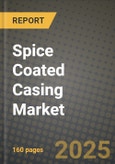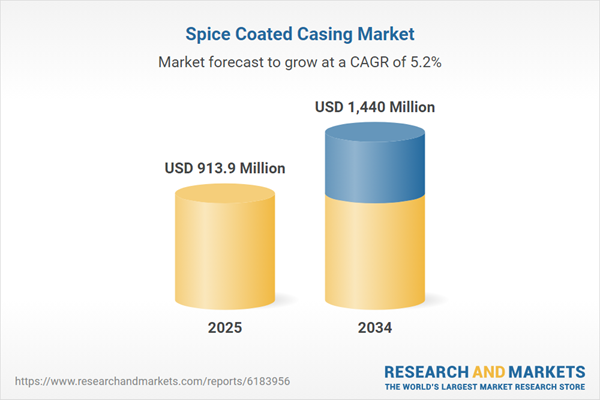Spice Coated Casing Market
The Spice Coated Casing Market serves industrial and artisanal processors that want built-in flavor, color, and visual identity directly on sausage and deli formats. Applications span fresh and cooked sausages, smoked and semi-dry products, hot dogs and frankfurters, specialty regional styles (chorizo, merguez, bratwurst), poultry and seafood rolls, and premium private-label lines. Coatings include dry spice blends, herb particulates, smoke and colorants, oil-bound slurries, and functional layers that enhance adhesion, slice integrity, and browning. Current trends emphasize clean-label spice systems (allergen and additive management), natural colors, halal/kosher compliance, and differentiation through coarser particulates and signature blends that present well at retail. Processors are integrating inline applicators and tumble/gel systems with collagen, cellulose, fibrous, and natural casings to improve yield and reduce labor, while plant-based and hybrid proteins create demand for alternative, vegan-compatible casings with robust spice adhesion. Drivers include SKU premiumization, display-case “shelf theater,” consistency across multi-site networks, and the economics of seasoning-on-casing versus post-cook rubs. The competitive landscape comprises global casing producers, regional spice and ingredient houses, co-packers, and equipment specialists that offer turnkey solutions - casing, coating, and applicator - under technical service agreements. Quality assurance focuses on particle retention, even coverage, thermal stability, purge control, and micro risk mitigation via validated lethality steps and antimicrobial strategies. Challenges involve volatile spice sourcing, labeling scrutiny (allergens, declarations), standardizing adhesion across moisture/fat levels, and maintaining performance through freezing, MAP, and distribution. Overall, spice coated casings are evolving from decorative finishes to engineered carriers that deliver flavor, brand identity, and manufacturing efficiency.Spice Coated Casing Market Key Insights
- Format versatility drives adoption: Collagen, cellulose, fibrous, and selected natural casings accept tailored coatings, enabling consistent look and flavor from snack sticks to large-diameter deli logs with minimal line changeovers.
- Clean-label momentum: Natural colors, simplified declarations, and allergen-aware recipes (e.g., mustard, sesame) shape procurement; spice heat management and low-salt profiles broaden family and health-positioned SKUs.
- Adhesion & texture engineering: Binder systems (proteins, hydrocolloids, oils) and controlled moisture windows improve particulate lock-down, minimizing fall-off in high-speed lines and after slicing or vacuum packing.
- Process integration wins: Inline coaters, oil-misters, and drum applicators tied to depositor speed synchronize coverage and reduce rework; CIP-friendly designs lower downtime and cross-contact risk.
- Food safety by design: Validated lethality/kill-step strategies, low-aw spice handling, and antimicrobial hurdles target Listeria and spoilage flora without compromising appearance or flavor intensity.
- Supply assurance matters: Diversified spice origins, steam/EO alternatives, and robust QA on contaminants (mycotoxins, heavy metals) protect brands amid global spice volatility.
- Brand storytelling at shelf: Visible herbs, pepper flakes, and regional spice signatures create premium cues and support limited-time offers, aiding velocity without major reformulation.
- Plant-based compatibility: Vegan or alginate casings with spice coats enable familiar sensory cues for non-meat products; adhesion and oil migration control are pivotal for clean slicing.
- Sustainability pressures: Reduced packaging via on-casing flavor delivery, recycled liners, and optimized water/energy in cleaning support retailer scorecards and processor ESG targets.
- Service and validation as moats: Application playbooks, pilot-line trials, and onsite commissioning shorten commercialization cycles; SPC on coverage and fall-off cements long-term contracts.
Spice Coated Casing Market Reginal Analysis
North America
A large processed-meat base and strong private-label programs favor spice coated casings for premium tiers and seasonal rotations. Processors prioritize clean-label claims, allergen control, and high-speed adhesion stability for snack sticks and smoked sausages. Foodservice and club formats value consistent browning and reduced back-of-house labor. Equipment vendors bundle applicators with technical service and validation support.Europe
Heritage styles and strict labeling steer natural colors and region-specific spice profiles. Retailers emphasize transparent declarations and visual differentiation at deli counters. Automation in mid-sized plants focuses on CIP-ready coaters and traceable spice lots. Halal and organic lines expand in select markets, while sustainability targets push water/energy optimization and recyclable liner materials.Asia-Pacific
Rapid growth in convenience meats and modern trade increases demand for visually distinctive, moderately spiced products. Local flavor systems (peppercorn, chili, five-spice, curry) require heat and color stability through high-humidity distribution. Plant-based launches in Australia, Japan, and parts of Southeast Asia adopt vegan-compatible casings. Regional spice sourcing and quick service turnaround are key differentiators.Middle East & Africa
Halal compliance, bold spice profiles, and hot-climate logistics guide specifications. Large hospitality and modern retail favor consistent coverage and low fall-off under extended chill chains. Processors seek turnkey lines with validated sanitation and simple operator training. Local spice blending partnerships help manage cost and authenticity.South & Central America
Strong traditions in chorizo and regional sausages align well with coated fibrous and collagen casings. Retailers push vibrant, coarse-particulate looks for grab-and-go. Processors value resilient adhesion through freeze/thaw and MAP. Supply reliability, practical training, and flexible financing of applicators influence vendor selection.Spice Coated Casing Market Segmentation
By Product
- Rolled Tubing Casings
- Flat Sheets Casings
- End Sealed Casings
- Cut Sleeves Casings
By Coating
- Plastic Casings
- Spice sheets
- Spice cut pieces
- Spice reels
By Material
- Real parchment
- Woven fabric
- Protein coated woven fabric
- Plastic coated woven fabric
- Hardened protein
By Application
- Dry sausage
- Smoked pork and ham
- Cheese
Key Market players
Viscofan, Devro, Viskase Companies, Kalle GmbH (Walsroder), ViskoTeepak, Fibran Group, Nippi Collagen (Nitta Gelatin), Shenguan Holdings, Atlantis-Pak (AMIFLEX), World Pac International, FABIOS S.A., CaseTech GmbH, DAT-Schaub Group, Ennio International, Overseal Natural IngredientsSpice Coated Casing Market Analytics
The report employs rigorous tools, including Porter’s Five Forces, value chain mapping, and scenario-based modelling, to assess supply-demand dynamics. Cross-sector influences from parent, derived, and substitute markets are evaluated to identify risks and opportunities. Trade and pricing analytics provide an up-to-date view of international flows, including leading exporters, importers, and regional price trends.Macroeconomic indicators, policy frameworks such as carbon pricing and energy security strategies, and evolving consumer behaviour are considered in forecasting scenarios. Recent deal flows, partnerships, and technology innovations are incorporated to assess their impact on future market performance.
Spice Coated Casing Market Competitive Intelligence
The competitive landscape is mapped through proprietary frameworks, profiling leading companies with details on business models, product portfolios, financial performance, and strategic initiatives. Key developments such as mergers & acquisitions, technology collaborations, investment inflows, and regional expansions are analyzed for their competitive impact. The report also identifies emerging players and innovative startups contributing to market disruption.Regional insights highlight the most promising investment destinations, regulatory landscapes, and evolving partnerships across energy and industrial corridors.
Countries Covered
- North America - Spice Coated Casing market data and outlook to 2034
- United States
- Canada
- Mexico
- Europe - Spice Coated Casing market data and outlook to 2034
- Germany
- United Kingdom
- France
- Italy
- Spain
- BeNeLux
- Russia
- Sweden
- Asia-Pacific - Spice Coated Casing market data and outlook to 2034
- China
- Japan
- India
- South Korea
- Australia
- Indonesia
- Malaysia
- Vietnam
- Middle East and Africa - Spice Coated Casing market data and outlook to 2034
- Saudi Arabia
- South Africa
- Iran
- UAE
- Egypt
- South and Central America - Spice Coated Casing market data and outlook to 2034
- Brazil
- Argentina
- Chile
- Peru
Research Methodology
This study combines primary inputs from industry experts across the Spice Coated Casing value chain with secondary data from associations, government publications, trade databases, and company disclosures. Proprietary modeling techniques, including data triangulation, statistical correlation, and scenario planning, are applied to deliver reliable market sizing and forecasting.Key Questions Addressed
- What is the current and forecast market size of the Spice Coated Casing industry at global, regional, and country levels?
- Which types, applications, and technologies present the highest growth potential?
- How are supply chains adapting to geopolitical and economic shocks?
- What role do policy frameworks, trade flows, and sustainability targets play in shaping demand?
- Who are the leading players, and how are their strategies evolving in the face of global uncertainty?
- Which regional “hotspots” and customer segments will outpace the market, and what go-to-market and partnership models best support entry and expansion?
- Where are the most investable opportunities - across technology roadmaps, sustainability-linked innovation, and M&A - and what is the best segment to invest over the next 3-5 years?
Your Key Takeaways from the Spice Coated Casing Market Report
- Global Spice Coated Casing market size and growth projections (CAGR), 2024-2034
- Impact of Russia-Ukraine, Israel-Palestine, and Hamas conflicts on Spice Coated Casing trade, costs, and supply chains
- Spice Coated Casing market size, share, and outlook across 5 regions and 27 countries, 2023-2034
- Spice Coated Casing market size, CAGR, and market share of key products, applications, and end-user verticals, 2023-2034
- Short- and long-term Spice Coated Casing market trends, drivers, restraints, and opportunities
- Porter’s Five Forces analysis, technological developments, and Spice Coated Casing supply chain analysis
- Spice Coated Casing trade analysis, Spice Coated Casing market price analysis, and Spice Coated Casing supply/demand dynamics
- Profiles of 5 leading companies - overview, key strategies, financials, and products
- Latest Spice Coated Casing market news and developments
Additional Support
With the purchase of this report, you will receive:- An updated PDF report and an MS Excel data workbook containing all market tables and figures for easy analysis.
- 7-day post-sale analyst support for clarifications and in-scope supplementary data, ensuring the deliverable aligns precisely with your requirements.
- Complimentary report update to incorporate the latest available data and the impact of recent market developments.
This product will be delivered within 1-3 business days.
Table of Contents
Companies Mentioned
- Viscofan
- Devro
- Viskase Companies
- Kalle GmbH (Walsroder)
- ViskoTeepak
- Fibran Group
- Nippi Collagen (Nitta Gelatin)
- Shenguan Holdings
- Atlantis-Pak (AMIFLEX)
- World Pac International
- FABIOS S.A.
- CaseTech GmbH
- DAT-Schaub Group
- Ennio International
- Overseal Natural Ingredients
Table Information
| Report Attribute | Details |
|---|---|
| No. of Pages | 160 |
| Published | November 2025 |
| Forecast Period | 2025 - 2034 |
| Estimated Market Value ( USD | $ 913.9 Million |
| Forecasted Market Value ( USD | $ 1440 Million |
| Compound Annual Growth Rate | 5.2% |
| Regions Covered | Global |
| No. of Companies Mentioned | 15 |









